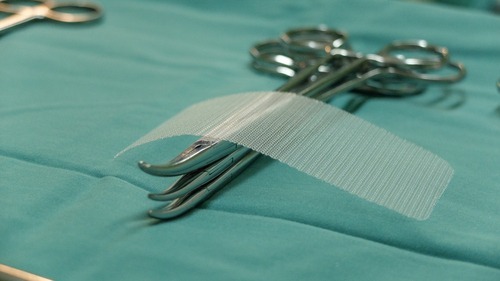Manufacturers of hernia mesh devices have a duty of care to its consumers when designing, manufacturing, and marketing the product. There is also a duty to warn consumers of the product’s dangers if those dangers are known. The health and wellbeing of so many patients are dependent on the safe use of the medical devices aimed at addressing their specific health conditions or disorders. When a device is defective, it can do harm. And when it does, the manufacturer may be liable in a hernia mesh lawsuit.
Personal injury and product liability lawyers at Shouse Law Group answer common questions people have about manufacturers of hernia mesh products.
- 1. Who makes hernia mesh devices?
- 2. What are the duties of a hernia mesh device manufacturer?
- 3. When can a manufacturer be liable for a personal injury?
- 4. Who else can be held liable for personal injuries caused by a hernia mesh medical device?
- 5. What are common injuries patients have experienced from defective hernia mesh devices?
- 6. When should you contact a product liability attorney for injuries suffered from a defective mesh implant?

1. Who makes hernia mesh devices?
Designers and manufacturers of hernia mesh devices range from startups to some of the world’s largest companies. In the United States, any hernia mesh product manufactured by one of the companies must be approved b the U.S. Food and Drug Administration (FDA) before it reaches the market. Some of the most prevalent manufacturers with hernia mesh products on the market include the following:
- Atrium. Atrium is one of the largest producers of mesh products. Some of the company’s hernia mesh — namely, the C-Qur model — have been the subject of FDA recalls and consumer lawsuits.
- Bard. Bard, Inc. is another manufacturer of hernia mesh products. Its mesh products, too, have been the subject of FDA recalls and lawsuits.
- Covidien. Covidien is a smaller company but a large producer of mesh devices. Its mesh products have also been linked to adverse effects. Lawsuits have recently been filed against its Parietex hernia mesh device.
- Ethicon. Ethicon is a division of Johnson and Johnson. It’s Physiomesh Flexible has been the subject of a recall and lawsuits.
- Genzyme Biological. Genzyme Biological is a much smaller company. It was the original creator of Sepramesh technology, which was subsequently purchased by Bard. Sepramesh technology, however, has been linked to many complications.
- Gore Medical. Gore Medical produces several different mesh products. Its Gore-tex mesh has been recalled due to its link to serious complications.
This list of manufacturers is not exhaustive, but it does represent the makers of some of the more prominent mesh products on the market — the same products that have been subject to lawsuits in recent years due to serious complications.
2. What are the duties of a hernia mesh device manufacturer?
The specific definition of duties associated with manufacturers of medical devices vary according to each state’s legislation and/or case law. Some legal doctrines, however, transcend state-specific product liability law. Manufacturers responsibilities are founded on the following two duties:
- a duty of care; and
- a duty to warn.
2.1 What is the duty of care?
Manufacturers have a legal obligation to and special relationship with suppliers, retailers, and — among others — consumers. This relationship establishes a duty of care. Duty of care requires the manufacturer to design and make products, like hernia mesh devices, in a way that a reasonable and prudent company would do.
This duty of care extends to inspecting and investigating the components used in the making of products and the final product itself. The indirect intent of this duty of care is the provision of safe products for the market. The latter means that the products should be safe under normal use and should be free from manufacturing defects.
2.2 What is a duty to warn?
The duty to warn refers to a manufacturers duty to disclose and inform users of any potential knowns risks, side effects, or hazards that the manufacturer knows or could have known about the product. In the case of medical devices, these risks, side effects, or other hazards involve those that could or would have been discovered if the manufacturer followed generally accepted medical and scientific knowledge available at the time the product was designed and made or at the time the product was sold.
This duty to warn is two-pronged:
- a duty to inform users of risks, side effects, and/or hazards they may not know about; and
- a duty to inform users (or remind them) of foreseeable hazards they may be aware of but may ignore due to familiarity with the product.
The risks associated with the products must:
- present a substantial danger when used as intended; or
- present a substantial danger when improperly used but in a reasonably foreseeable way; and
- be risks that ordinary users would not have been able to recognize on their own.
The warning must be in language the user can understand and must be without ambiguity. Manufacturers do not need to warn about open and obvious risks or hazards.
3. When can a manufacturer be liable for a personal injury?
A manufacturer can be held liable for a personal injury when it breaches its duty and injury is directly caused by the manufacturer’s product. Liability can occur in one of two ways:
- Negligence; or
- Strict liability.
3.1 What is negligence?
In negligence cases, a manufacturer fails to exercise reasonable care in its:
- design,
- manufacture,
- packaging, and/or
- marketing of its product,
and due to the breach of care, the product is unreasonably dangerous.
With regard to hernia mesh devices, the focus of a negligence case would be on:
- the manufacturer’s actions or lack thereof (e.g., knowing mesh product may result in a specific injury but not providing adequate warning of the same); and
- how those actions or inaction breached a duty of care (e.g., failing to inform of a known side effect or danger); and
- how the breach caused personal injuries (e.g., the patient had a mesh implant inserted and the defective implant caused the known injury).
3.2 What is strict liability?
Strict liability refers to products as opposed to care the manufacturer of the product takes or does not take. Under a theory of strict liability, the manufacturer is guilty without the claimant or plaintiff having to prove the manufacturer failed to do something. But to file a claim under strict liability, there must be an argument that the product was defective in some way. A defective product can materialize in three ways:
- Design defect, where the design was unreasonable;
- Manufacturing defect, where the design may have been reasonable but the making of the product was flawed; and
- Marketing defect, where proper warnings or instructions about the product are not provided or not provided correctly.
Lawsuits for injuries caused by defective hernia mesh products have been the result of all three of these defects.
4. Who else can be held liable for a hernia mesh medical device defect?
Manufacturers are not the only ones who can be held liable for a product, including a hernia mesh medical devices. Any person or entity along the chain of distribution of the mesh product can be held liable depending on the facts and circumstances. A product liability attorney can help you identify all persons and/or entities that may be liable jointly or severally for your injuries caused by the mesh implant.
Here are examples of other persons or entities that can be held liable for defective hernia mesh products.
- Testing laboratories
- Wholesalers
- Retailers
- Doctors or other medical professionals
- Hospitals
- Medical sales representatives.
5. What are common injuries patients have experienced from defective hernia mesh devices?
Personal injuries that are most common to hernia mesh devices and past and current lawsuits for the same include:
- Adhesion
- Abdominal pain
- Bowel obstruction
- Infections
- Migration
- Perforation of organs or tissues
- Seromas
- Chronic pain
- Mesh failure
- Recurrence of the hernia following mesh surgery
- Groin and testicular pain
- Delayed and/or long-term consequences.

6. When should you contact a product liability attorney for injuries suffered from a defective mesh implant?
When you experience any of the above injuries or complications after hernia repair surgery, then you may be owed compensation for your damages. There have been hernia mesh devices that have been recalled by the FDA either temporarily or permanently due to defects. There are currently investigations into other hernia mesh devices that may have a defect. There have been many hernia mesh lawsuits that have been settled in favor of the victims. There are ongoing lawsuits for the same.
You should speak with a personal injury lawyer or product liability attorney about your case. It all comes down to the specific facts, and only by speaking with an experienced attorney can you know your options.
Shouse Law Group has local offices throughout California, Nevada, and Colorado. We represent clients who have been injured by defective hernia mesh. Contact us to learn more about your options today.
